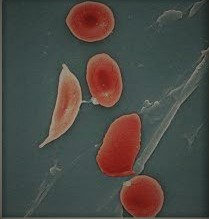What is sickle cell Anemia
Sickle cell anemia is an inherited blood condition in which red blood cells take on the appearance of a sickle or crescent. It causes repeated infections, swollen hands and legs, pain, extreme exhaustion, and delayed puberty. During crises, pain medications may be used; hydroxyurea may be used to limit the number of pain episodes; antibiotics and vaccinations may be used to avoid bacterial infections; and blood transfusions may be required.
Sickle cell Anemia Treatment: Any Hope
While a solution for this debilitating condition has eluded researchers, a recent study published in the New England Journal of Medicine (Biologic and Clinical Efficacy of LentiGlobin for Sickle Cell Disease/Kanter et al.) may offer hope.
Martin Steinberg, MD, professor of medicine at Boston University School of Medicine, comments in an editorial in this week's New England Journal of Medicine on the findings of the study, which was the first successful gene therapy for sickle cell disease that adds a gene to patient blood stem cells that prevents sickle cell disease complications. "Gene therapy with autologous stem cells expands the potential of a cure to all patients without the necessity for immunosuppression," Steinberg, a haematologist at Boston Medical Center, adds.

While the patients in the study no longer showed symptoms of sickle cell disease, Steinberg points out that majority of them still had a lower than normal red blood cell lifespan, which he believes may be linked to long-term consequences.
For people to accept this rigorous and expensive treatment, Steinberg feels it must be curative or almost curative and last a lifetime. "At this moment, we don't know how long the results will last," he says, "but the prospects appear good based on this study."
Steinberg admits that even the most effective gene treatment will not improve the health of the majority of sickle cell disease patients around the world. "The majority of people with this condition live in Africa and India, where high-tech health care is scarce. More medicines that can be administered orally to raise foetal haemoglobin levels are needed. This will have a greater chance of assisting those who are most affected by the disease."
.
Reference:
Julie Kanter, Mark C. Walters, Lakshmanan Krishnamurti, Markus Y. Mapara, Janet L. Kwiatkowski, Stacey Rifkin-Zenenberg, Banu Aygun, Kimberly A. Kasow, Francis J. Pierciey, Melissa Bonner, Alex Miller, Xinyan Zhang, Jessie Lynch, Dennis Kim, Jean-Antoine Ribeil, Mohammed Asmal, Sunita Goyal, Alexis A. Thompson, John F. Tisdale. Biologic and Clinical Efficacy of LentiGlobin for Sickle Cell Disease. New England Journal of Medicine, 2021; DOI: 10.1056/NEJMoa2117175






_underway_during_sea_trials_on_11_May_2017.jpg)

0 Comments
Feedback will be Appreciated